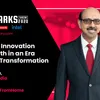Over the decades, knowledge management (KM) has emerged as a key discipline for improving productivity, growth, risk management, and innovation in companies around the world. See YourStory’s coverage of the CII Global Knowledge Virtual Summit 2020 and Bangalore K-Community.
Unisys is a multi-billion-dollar global IT company that builds high-performance, security-centric solutions for businesses and governments. Unisys is built on over 145 years of business excellence and innovation.
It provides multi-cloud solutions including cybersecurity, digital government, core and retail banking, and travel and transportation. It transforms and manages clients’ applications, data, networks, and devices. The company is headquartered in Blue Bell, Pennsylvania, and has a global workforce of over 20,000 associates.
Unisys India is a microcosm of Unisys Corporation and a strategic offshore delivery centre with multiple facilities in Bengaluru and Hyderabad, and a talent pool of about 4,500 associates. Its client base in India is focused on commercial, banking and financial services sectors.
Shilpa Sharma is the Knowledge Management Lead for the India Technology Centre at Unisys. She is a senior technology and innovation leader, with an established record of success in innovation and technical software product development. She has been with Unisys for more than six years now, and currently leads the Unisys Global Innovation Practice, which is responsible for new product development.
Shilpa comes with prior experience from product companies such as Yahoo, Nokia, and Tech Mahindra, working in domains spanning from mainframes and mobiles to online advertising and billing systems. Knowledge management is one of her passions, enabling her to contribute significantly to technology innovation at Unisys. Shilpa is an engineering graduate and an alumnus of IIM Bangalore.
Shilpa joins YourStory in this interview on the knowledge management (KM) journey and impacts at Unisys. See also YourStory’s profiles of MIKE award winners EY, Tata Steel, Cognizant Technology Solutions, Afcons Infrastructure, Petroleum Development Oman, BINUS University, and Mobarakeh Steel Company.
Edited excerpts of the interview:
YourStory [YS]: How would you describe the KM journey at Unisys, in terms of phases and achievements?
Shilpa Sharma [SS]: The knowledge management journey of Unisys is an ideal example of how knowledge acquisition, retention and dissemination can help build a culture of innovation and thought leadership. Collaboration is a key element of our KM programme.
The Unisys India Knowledge Management team evolved over time, over phases like forming, storming, norming, performing, and beyond. The KM journey started in 2013. The initial days were about building a framework to support this engagement, getting leadership buy-in, and garnering cross-team engagement.
We started small at project-level and our KM strategy was focused on building and streamlining the project and process knowledge base that could be shared within teams so that they could learn from each other’s experience. This evolved into a movement that brought together various teams and ultimately the whole business unit through internal and external Communities of Practices, collaborative engagements, and various innovation practices.
By 2014-15, we had established a common KM framework and achieved significant progress in terms of knowledge sharing and collaboration. Years 2016 to 2019 saw us make significant progress in innovation and thought leadership by virtue of our knowledge management initiatives.
Our journey is ongoing and in 2020 and beyond, we will continue to further organisational growth and innovation with the power of knowledge management.
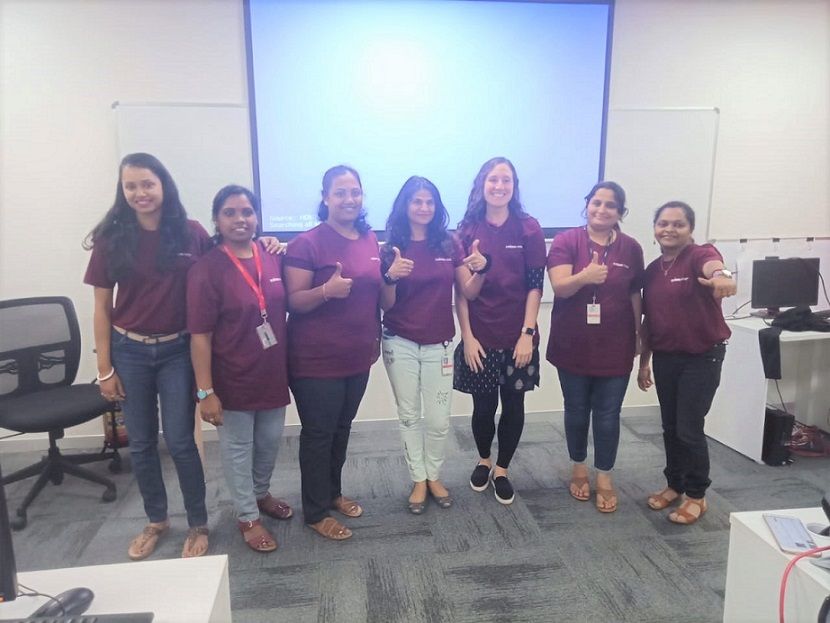
Shilpa Sharma (centre) with members of Unisys Innovation Team
YS: What kinds of impact has KM delivered to your business?
SS: Our KM programme is spread over various aspects of knowledge acquisition and knowledge sharing. We have benefited from our KM practices in several ways.
Knowledge sharing within teams: Our knowledge repositories hold a wealth of information and insights on best practices and learnings from the members. This repository helps enrich induction and training plans for individual project teams, so new team members can be more effective from the start.
Enterprise learning: The programme has facilitated enterprise-wide learning through cross-team knowledge sharing and adoption of best practices. It includes a common repository that features knowledge assets, best practices and success stories from each team that other teams can leverage.
Reaching out to wider communities: Some of our knowledge building and knowledge sharing initiatives include connecting with the academia and wider industry ecosystem, and fostering industry-wide learning. Campus Connect, Cloud 20/20™, Unisys Hackathon 20/20, NASSCOM Tech Series, and Tech Connect initiatives are examples of these.
Accelerating innovation: Our knowledge repositories have served as a starting point for new patents and productivity improvements. The knowledge base built from Hackathons or Hackfests conducted as part of some of our innovation drives have led to several new products and product roadmap ideas, and triggered Proof of Concepts as well as Minimum Viable Product (MVP) development and research.
Building thought leadership: A key component of our knowledge management programme is disseminating information to relevant communities via blogs, communities, etc, where subject matter experts can share their insights on various topics. These help subject matter experts build their personal brand and also paves the way for opportunities in external conferences. Thus, they help drive individual and organisational growth, along with furthering the cause of KM.
Continuous learning: Our knowledge repositories retain designs, frameworks, coding practices, and processes, and provide a foundation for reuse and continuous learning for our organisation.
Business wins: The sharing of best practices and success stories across teams has also enabled our client-facing teams to access relevant inputs while working towards new business deals, contributing to their success.
There are many examples of innovation, new product development, and product roadmap definition based on research ideas generated via our KM initiatives. They include PharmaTrack, Stealth SmartWire, Use of Blockchain to Secure InfoImage, Microservices based SaaS/PaaS, Touchless Interface-AR/VR, Intelligent Alerting using AI/ML, and many more.
KM also played a very important role in managing and promoting patent productivity in Unisys. We follow the practice of capturing the ideas generated in Unisys internal/external Hackathons and Cloud 20/20™ events in a common KM repository/portal.
This helped retain the knowledge for analysis and future reference. Research and patent teams studied those ideas and assessed them from an IP perspective. This culture is nurturing and improving patent productivity. The innovation/idea portal is open to all employees for idea submission.
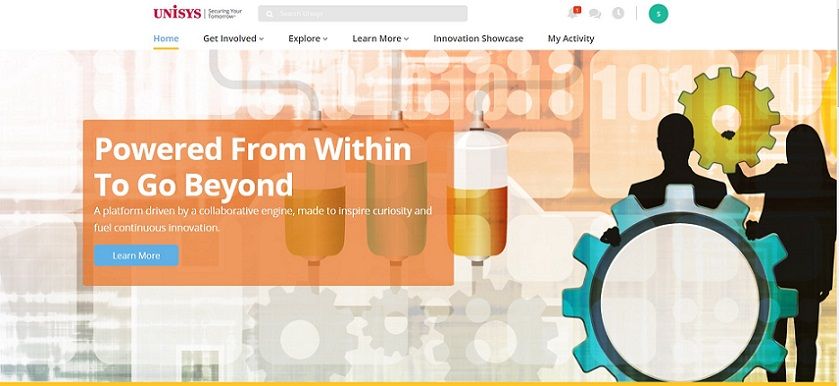
Unisys Innovation Portal
YS: Can you share examples of processes where KM is embedded into the workflow?
SS: In Unisys, KM started as an initiative but over time, it has become an integral part of our system, processes and overall Unisys culture. Knowledge sharing and collaboration are integral to the way we operate — more specifically, as one of the defined goals in HR practices/guidelines that is followed across the organisation.
There are some processes such as documenting and retaining project requirements specifications, project plans, design documents, learnings, and best practices, where KM is embedded in the process itself.
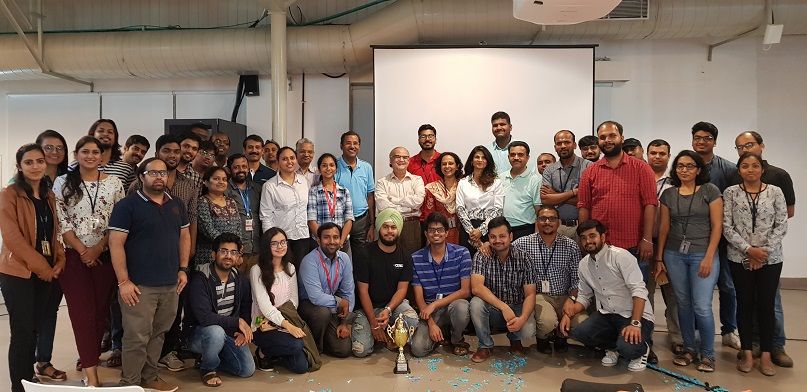
Awards ceremony with Unisys Innovation Team
YS: Can you describe some of your internal and inter-organisational Communities of Practice?
SS: Several Communities of Practice exist within the organisation. These may be across teams, functions, and business units. Some of these include the Knowledge Management Practice and the Innovation Practice.
We conduct Global Innovation Campaigns where we source ideas from associates that further enrich our knowledge base, besides fueling innovation. We also host Global Tech Talks, Webinars, and Workshops for regular dissemination of insights from our knowledge base.
Events such as Unisys Hackathon 20/20, NASSCOM Tech Connect, Tech Series, Cloud 20/20™, and Campus Connect help us both broaden our horizons and enrich our knowledge base with inputs from the industry and academic community. In fact, some of these initiatives such as Cloud 20/20™ have connected many academic institutions and students to our organisation.
The Cloud 20/20™ technical project contest has received close to 50,000 registrations and 5,000 idea submissions. Unisys has filed a patent from one of the winning ideas while some of the other winning ideas have been made a part of Unisys sponsored research. With participation from over 3,000 educational institutions so far, the event is in its 12th year now.
We have conducted three NASSCOM Tech Series events in the last three years. The themes covered include Security, Secure IoT, and AI/ML Trends. We have conducted two NASSCOM Tech Connect events since 2018, with key themes being Digital Technology Platforms and Cloud Migration.
Unisys has conducted two Hackathons in the last three years and the themes included AI, Machine Learning, Blockchain, IoT, and Security. We received 2,000+ registrations for these and 200+ ideas in all. The participants included freshers and experienced professionals.
YS: What are some of the roles and responsibilities of your KM team members?
SS: The different roles that exist within our KM team include strategist, lead, and champions.
The KM Strategist/Leader is responsible for KM strategy, design and development, seeking buy-ins from the leadership team on the proposed programs, and providing regular updates on progress made and ROI to the leadership team. The leader also identifies ways to strengthen the KM practice and works with KM leads to define and implement KM practices.
KM Leads work in collaboration with the KM leader and KM champions to expand the scope of the KM framework and drive implementation across the organisation.
KM Champions are a group of representatives from each team/project who promote, support and communicate KM initiatives within their projects/groups. The responsibilities of KM champions/leads include advocacy, support and brokering.
Advocacy involves spreading the word and establishing the importance of KM within groups and teams. The support role is about acting as a representative for various KM initiatives and being a point of contact for their project/group team.
Knowledge brokering entails linking team members to resources normally outside their immediate context. Knowledge brokers help people from within their teams connect with the larger body of knowledge that would help them with their requirements and demonstrate a willingness to collaborate and assist.
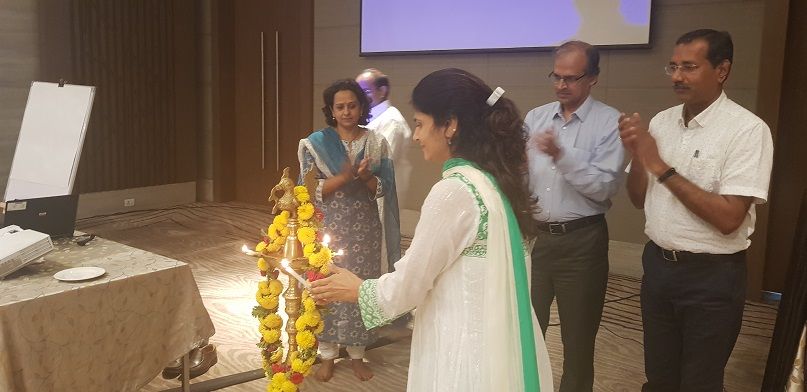
Shilpa Sharma (centre) at Unisys innovation event
YS: What are some emerging opportunities and technologies that will impact your KM strategy?
SS: The effect of emerging technologies like digital transformation, AI/ML and IoT are already visible on KM. These technologies are defining new trends in terms of consolidating the fragmented and scattered data, identifying the right solutions for each problem statement, and facilitating better decision-making so as to drive the right actions to support business strategy.
Unisys is also looking into some of these technologies to modernise and enhance our KM practices.
YS: What has been the impact of the COVID-19 on your KM initiatives?
SS: Virtual collaboration is the new normal now. Our focus is on digital transformation to create a more structured environment for maximum adoption, productivity and compliance.
The objective is to provide simple and seamless access to our knowledge assets to every end-user, and make the process of contributing to our KM efforts as easy as possible.
YS: What are some of the next steps in your KM journey?
SS: As we continue to evolve on our KM journey, our next key milestone will be the creation of a centralised Knowledge Management Portal, where our knowledge assets will be uploaded, appropriately tagged and made available for the entire business unit/organisation to leverage.
We also plan to enrich some of our initiatives such as Cloud 20/20™, which enable us to connect with the broader industry, clients, partners and academia, providing a platform for learning and exchanging ideas.
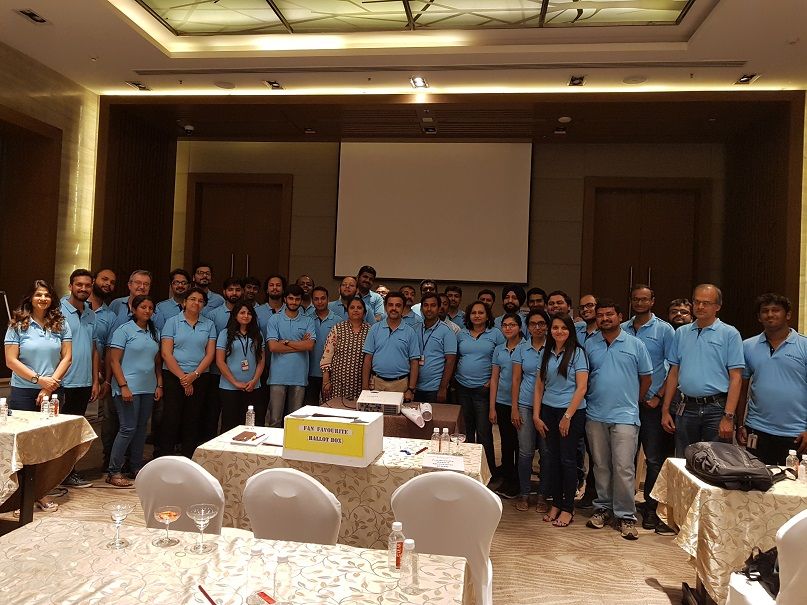
Event with Unisys Innovation community
YS: What are some of your tips or recommendations to other organisations, on how to develop and sustain a KM strategy?
SS: We would like to emphasise that KM is a very powerful tool. It can become a great enabler for several business processes and can be leveraged to promote business continuity and success, besides fuelling innovation.
Here are a few basic steps to initiate KM in your organisation. Clearly define what knowledge management means to your organisation. Establish the need for it in your organisation. Engage the leadership and get their buy-in.
Start small and start with what you have. Create a KM goal/objective and work towards it. Evolve step by step on this journey. Form a team having people with clear roles and responsibilities in line with KM goals.
Edited by Kanishk Singh
Link : https://yourstory.com/2020/11/knowledge-management-innovation-unisys
Author :- Madanmohan Rao ( )
November 18, 2020 at 07:15AM
YourStory

